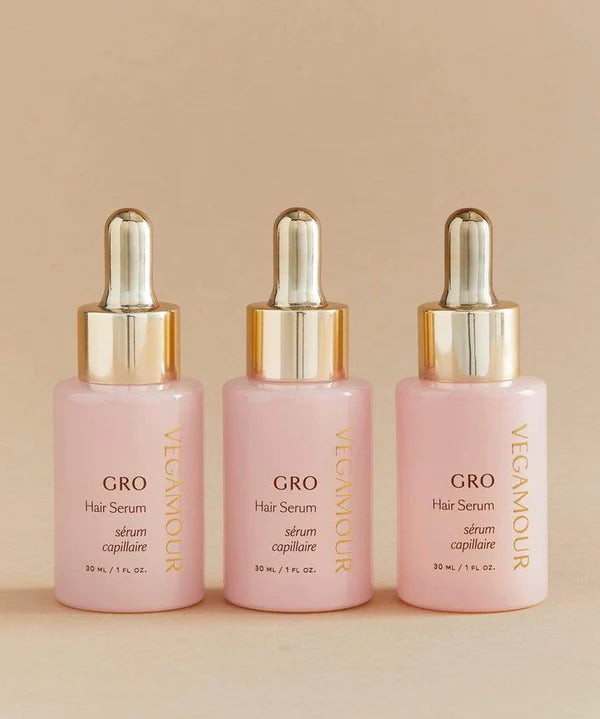Even though we are well on our way out of a global pandemic that brought stress levels among the American public to an all-time high, stress-related hair shedding continues to run rampant.
People are still finding clumps of hair in their shower drain, or waking up to what seems like way too many loose strands on their pillowcases in the morning. The truth is, it’s going to take a minute to get our general well-being, and our stress induced hair loss, back in check.
There is a strong link between stress and hair loss, but the good news is that you can take steps to reverse and even prevent stress related hair shedding. Plus, find out what products you should use to combat thinning hair.
How Exactly Does Stress Cause Hair Loss?
For most folks, even the word “stress” conjures up a whole swath of negative associations: sleepless nights, poor diet choices, a tense neck and/or shoulders and, in extreme cases, maybe even illness.
And while it’s true that stress can cause a wide variety of problems for our health and well-being, it’s also true that stress is a needed and necessary response in even the most happy and healthy of bodies.
Cortisol, otherwise known as “the stress hormone,” gets a bad rap but in fact it’s responsible for so many bodily processes that it would be impossible to live without. The trouble begins when our bodies start to get a little trigger happy with the stress response, since stress (real or perceived) raises cortisol levels in the body.
Cortisol, in turn, triggers the release of pro-inflammatory cytokines. Cytokines are proteins that act as messengers between cells. They help regulate many bodily functions, including—you guessed it—inflammation. They can either cause inflammation or fight it, depending on what’s needed.
When cytokines fight inflammation, blood flow is reduced to the skin, which may become irritated, sensitive and red, and hair follicles can essentially be cut off from their nutrient source. When cytokines are out of balance, hair growth is hindered.
#include-related-slider#
Cytokine imbalance is also believed to be a major part of hair loss in alopecia areata (AA), a condition believed to be caused by an underlying autoimmune disorder. Alopecia areata is characterized by round patches of hair loss that most often happen on the scalp but can occur anywhere on the body. While this hair loss typically resolves within a year, it can become chronic and in extreme cases effect the entire body.
Increased cortisol production can also trigger your body to produce more sebum, your skin’s natural moisturizer. But while sebum is necessary for healthy hair, too much can be a bad thing — it can clog hair follicles and hinder healthy hair.
So while cortisol is essential in small doses over the short-term, if cortisol levels remain unnaturally high over the long-term then chronic stress runs the risk of impacting our weight, blood pressure, cognitive performance, blood sugar levels, and healthy hair growth.
Among the other types of hair loss caused by stress is telogen effluvium (or TE). Unlike alopecia areata, telogen effluvium is most often characterized by a very sudden and diffuse (all-over) hair thinning. You might notice more hair in the drain or on your brush than usual, or your overall hair density might suddenly take a dip.
Telogen effluvium is usually caused by an intense bout of stress. Often telogen effluvium is caused by a significant life event (the loss of a loved one, or losing your job, for example) but the sudden bout of stress linked to TE can also come from severe illness (like COVID-19 or the flu), a new birth control, a new medication or anything else that might cause a sudden and drastic shift in your physiology.
Because of the way hair growth cycles work, with telogen effluvium you won’t see hair shedding until a few months after the inciting incident and it might seem like you're losing all your hair at once! The good news is that telogen effluvium isn't typically a chronic condition and it's reversible: but do know that since hair growth takes time it will take several months for you to see visible hair regrowth.
If you think you might be experiencing hair loss due to stress, it’s time to see your doctor or a dermatologist who can help rule out other causes of hair loss and advise you on how to get on the road to recovery.
Shop Products for Thinning Hair
Manage Stress With A Holistic Approach to Health
To treat hair loss caused by stress, the best thing you can do is identify what is triggering heightened emotions and learn ways to cope in a healthy manner.
Here are a few science-back stress relievers to help you get started:
Establish a Morning Routine
Start your day off by creating a routine that makes you feel relaxed and centered before rushing out the door. Waking up 20 to 30 minutes earlier to meditate, do yoga or try a new beauty routine can help reduce feelings of anxiety.
To help with hair loss on your head, apply hair serum at your roots and continue with your normal routine. GRO Hair Serum, which has been shown to improve the appearance of hair density and decrease visual signs of shedding.
Get Outside
You don’t have to go on an elaborate hike to feel the positive benefits of exercise. Simply walking around your neighborhood for 10 to 20 minutes can get your endorphins flowing and help reduce stress. If you don’t like going to the gym, spending some time in your local park or outdoor space can be a great alternative.
Read: Top Causes of Hair Loss
Watch Something Funny
If you’re feeling stressed, turn on a show, movie or podcast that will make you laugh. There is wisdom to the old adage that laughter is the best medicine, science backs it up. During a good laugh, respiration, heart rate, and blood pressure temporarily rise. This causes oxygen to surge through the bloodstream that then results in lower blood pressure and thus helps relieve tension and stress.
Shop: Nicole Franzel-Arroyo's Top VEGAMOUR Picks
Meditate
Meditation is a scientifically-backed tool for managing stress. Meditating early in the morning before you leave the house will help you feel grounded and capable of dealing with situations and people that trigger feelings of stress and anxiety.
To start meditating, simply find a quiet and comfortable place and sit with your spine straight and close your eyes. Inhale deeply and exhale slowly. Focus on the way the air moves in and out of your body. Start practicing mindfulness by meditating for five minutes and add time as you begin to feel more comfortable.
Strive For A Balanced & Healthy Diet
We all know how important a healthy diet is to our general health and well-being, and diet can be a contributor to low-grade inflammation that affects hair growth.
Does that mean no comfort foods when stressed? No! But when stress strikes and you reach for a treat, try to make healthier choices by avoiding an excess of inflammatory ingredients like sugar, dairy, gluten, trans fats and alcohol.
If your diet is lacking certain nutrients, supplement with a vitamin designed for healthy hair, like GRO Biotin Gummies. They're packed with vitamins B-5, 6 and 12 to help support your body’s production of keratin and collagen, plus vitamins A, C and E to neutralize follicle-damaging free radicals while zinc helps to promote and maintain scalp health.
Get Adequate Rest
Yes, sleep is very important to living your best hair life. Why? Because proper sleep has been shown to reduce cortisol levels while a lack of sleep can create more inflammation in the body and hamper hair growth. In order to get proper sleep, as an adult this equates to between 7 and 9 hours every night.
#include-related-slider#
Take Care of Yourself and Your Hair
Hair wellness isn’t just about your stress levels — it’s about your entire approach to wellness, from the foods you eat to the products you use to how much quality sleep you get. Know that you are not alone right now, even if you feel isolated. So many are facing unimaginable stress as we continue to navigate our current epidemic. While taking care of your hair, don’t forget to take care of yourself too!
More From VEGAMOUR
- Does Creatine Cause Hair Loss? Here's What Research Says
- 5 Benefits of Scalp Massages (including Hair Growth!)
- Hair Story: How Stress & COVID Caused My Hair to Thin at Age 23




















